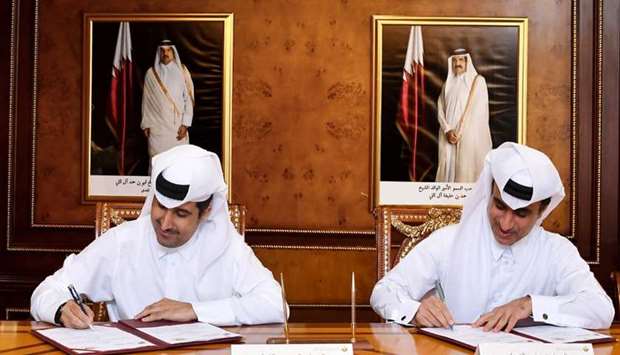Qatar Chamber and the Ministry of Administrative Development, Labour and Social Affairs (MADLSA) have signed an agreement to foster co-operation with regard to labour re-employment.
The co-operation agreement supports Qatar Chamber’s electronic platform for labour re-employment, which was launched in co-ordination with the ministry in July to re-employ skilled workers in the local market.
The agreement was signed by Qatar Chamber general manager Saleh bin Hamad al-Sharqi and assistant undersecretary for Labour Affairs at the MADLSA, Mohamed Hassan al-Obaidli, at the ministry’s headquarters.
The ceremony was also attended by Ali Busharbak al-Mansuri, assistant director general for Government Relations and Committee Affairs, and Fawaz Mohamed al-Rayyes, director of Employment Administration at the ministry.
The move aims to foster co-operation between the two parties in labour re-employment and to facilitate access to skilled labour, as well as to provide recruitment alternatives from abroad by establishing an electronic link between both sides.
Under the agreement, a joint committee of the chamber and the ministry would be formed to implement each party’s responsibilities and roles, which include boosting co-ordination between both sides, proposing additional areas of co-operation, and following up on the implementation of joint projects in accordance with the agreement signed.
Al-Obaidli said the ‘Labour Re-employment Platform’ reflects the ministry’s commitment to enhance public-private partnership, adding that maintaining skilled labour “is a key part” in Qatar National Vision 2030, and illustrates of the MADLSA’s commitment to the directives of the partnership.
He also thanked the chamber, particularly Qatar Chamber chairman Sheikh Khalifa bin Jassim al-Thani, for his sincere efforts in supporting the private sector. He noted that the platform “is of special importance” for local companies as an alternative for recruitment from abroad. Similarly, al-Obaidli thanked al-Sharqi for his efforts in fostering cooperation between the chamber and the ministry in labour issues.
Al-Sharqi said the agreement would facilitate the objectives of the chamber’s electronic platform, which aims to help companies obtain appropriate employment and ensure the continuity of projects and businesses in the local market.
“The chamber’s electronic platform also aims at helping companies find skilled labourers by employing laid-off workers from other companies, thus avoiding any shortage of labourers, which may cause failure in projects of these companies,” he stressed.
Al-Sharqi pointed out that before providing the platform’s link to recruiting companies, the chamber should confirm first through the Ministry that they did not violate labour-related laws.
He expressed the private sector’s gratitude and appreciation to the ministry for its support to the project, which would reduce the recruitment of workers from abroad by relying on existing workers in the local market.
Al-Sharqi also said the joint committee supervising the platform will cooperate to develop the platform, monitor observations of companies and businessmen, solve any obstacles, and propose suggestions to continuously improve the platform.
The agreement was signed by Qatar Chamber general manager Saleh bin Hamad al-Sharqi and assistant undersecretary for Labour Affairs at the MADLSA, Mohamed Hassan al-Obaidli, at the ministry’s headquarters.
The ceremony was also attended by Ali Busharbak al-Mansuri, assistant director general for Government Relations and Committee Affairs, and Fawaz Mohamed al-Rayyes, director of Employment Administration at the ministry.
The move aims to foster co-operation between the two parties in labour re-employment and to facilitate access to skilled labour, as well as to provide recruitment alternatives from abroad by establishing an electronic link between both sides.
Under the agreement, a joint committee of the chamber and the ministry would be formed to implement each party’s responsibilities and roles, which include boosting co-ordination between both sides, proposing additional areas of co-operation, and following up on the implementation of joint projects in accordance with the agreement signed.
Al-Obaidli said the ‘Labour Re-employment Platform’ reflects the ministry’s commitment to enhance public-private partnership, adding that maintaining skilled labour “is a key part” in Qatar National Vision 2030, and illustrates of the MADLSA’s commitment to the directives of the partnership.
He also thanked the chamber, particularly Qatar Chamber chairman Sheikh Khalifa bin Jassim al-Thani, for his sincere efforts in supporting the private sector. He noted that the platform “is of special importance” for local companies as an alternative for recruitment from abroad. Similarly, al-Obaidli thanked al-Sharqi for his efforts in fostering cooperation between the chamber and the ministry in labour issues.
Al-Sharqi said the agreement would facilitate the objectives of the chamber’s electronic platform, which aims to help companies obtain appropriate employment and ensure the continuity of projects and businesses in the local market.
“The chamber’s electronic platform also aims at helping companies find skilled labourers by employing laid-off workers from other companies, thus avoiding any shortage of labourers, which may cause failure in projects of these companies,” he stressed.
Al-Sharqi pointed out that before providing the platform’s link to recruiting companies, the chamber should confirm first through the Ministry that they did not violate labour-related laws.
He expressed the private sector’s gratitude and appreciation to the ministry for its support to the project, which would reduce the recruitment of workers from abroad by relying on existing workers in the local market.
Al-Sharqi also said the joint committee supervising the platform will cooperate to develop the platform, monitor observations of companies and businessmen, solve any obstacles, and propose suggestions to continuously improve the platform.

